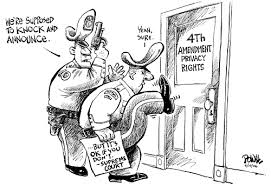 The US Supreme Court has waded into a controversial case that pits two Constitutional principles against each other, namely, the 2nd Amendment, the right to bear arms and the 4th Amendment, the right to be protected against unreasonable searches and seizures.
The US Supreme Court has waded into a controversial case that pits two Constitutional principles against each other, namely, the 2nd Amendment, the right to bear arms and the 4th Amendment, the right to be protected against unreasonable searches and seizures.
The case concerns the police entering a dwelling without a warrant and shooting a California couple.
The justices heard oral arguments in a 2010 case involving Los Angeles County deputies who shot a couple living in a shack in the backyard of a home in the city of Lancaster, north of Los Angeles. The deputies entered the structure without a warrant and without announcing themselves, and the couple was ultimately awarded $4 million in the shooting.
“The question in the end is who bears the brunt of the officers’ unreasonable conduct? Because there’s no allegation here” that the couple did anything wrong, Justice Stephen Breyer said.
When they entered, one of the officers saw a man holding a gun, shouted “gun” and two officers fired 15 shots. But the man deputies shot wasn’t the man they were looking for but a man staying in the shack, Angel Mendez, and his pregnant girlfriend.
In a case of bad timing, Mendez had picked up a BB gun at the time officers entered in order to move it. As a result of the shooting, Mendez’s leg had to be amputated below the knee.
Mendez was within his legal rights, protected by the 2nd Amendment to have and hold the BB gun. The question with which the justices must grapple concerns the officers’ entry into a private dwelling without a proper warrant.
The 9th Circuit ruled that the entry without a warrant violated the couple’s Fourth Amendment right to be free from unreasonable searches. Even a reasonable use of force by law enforcement becomes unreasonable, the court said, if an officer “intentionally or recklessly provokes a violent confrontation by committing a separate Fourth Amendment violation.”
The oral argument on Wednesday was dominated for a time by an extended exchange between Chief Justice John G. Roberts Jr. and Justice Elena Kagan about whether there would have been a different outcome had the deputies obtained a warrant before entering the shack. Justice Roberts noted that the lack of a warrant was irrelevant to the outcome of the case. “Why and in what way did the failure to get a warrant cause everything that followed?” Roberts asked the Mendezes’ attorney several times. “The failure to get a warrant did not cause the entry.”
Feldman responded: “If the officers don’t have a warrant and they enter, they are trespassers.”
The Supreme Court’s decision will affect police policy concerning shootings, warrantless entries, a citizen’s right to bear arms, and a citizen’s right to be safe and secure from unlawful searches and seizures. This is an important case and will bear close attention from the legal community and citizens alike.
